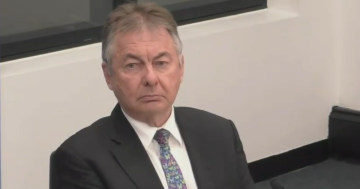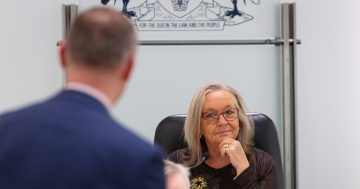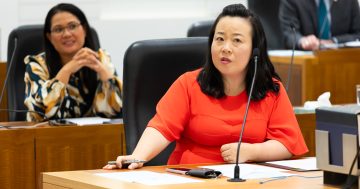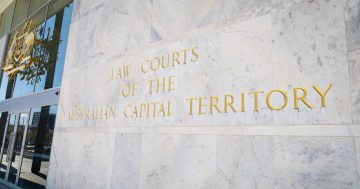
Alistair Coe will have to wear the decision to veto the nomination of Terence Higgins as the ACT’s first Integrity Commissioner. File photo.
The Canberra Liberals’ took a big backward step last week, resurrecting perceptions that the party is an outlier in ACT politics, rather than a party of alternative government.
Their decision to veto the appointment of former ACT Supreme Court Chief Justice Terence Higgins as the Territory’s first Integrity Commissioner, essentially because he was once a prominent member of the Labor Party, is not only petty politics (Chief Minister Andrew Barr called it nasty) but ignores the very legislation it helped pass in the Assembly to set up an ACT anti-corruption body.
The legislation clearly states that no one who has been a member of a political party in the past five years is eligible to head the new Integrity Commission. Mr Higgins left the Labor Party to go to the ACT Supreme Court in 1990, nearly 30 years ago.
There is no question Mr Higgins has had an esteemed career as a jurist, handling some of the ACT’s most challenging cases, and seemed a fine fit for this new role according to the selection criteria and the panel which recommended him.
But Opposition Leader Alistair Coe now says that past presidents of any political party are not appropriate to be the Commissioner overseeing politicians and public servants.
“The inaugural Integrity Commission needs to be beyond reproach,” Mr Coe said. “We must seek to avoid actual, potential or perceived conflicts of interest – I don’t think that this is too much to ask.”
This is not only a slur on Mr Higgin’s commitment to the rule of law and its institutions but ignores the reality that lawyers, for better or worse, are prominent players in the nation’s politics and that many on both sides have gone on to esteemed careers as judges.
It suggests that somehow Mr Higgins would be incapable of holding a Labor Government to account, but in fact the most effective opponent of the Barr Government appears to be former Labor Chief Minister Jon Stanhope, who has had no qualms about critiquing development and planning policies in particular.
Are we to believe that if the nominee was a former member of the Liberal Party, Mr Coe would be so concerned? Well now he has to be, and the decision could even set off a series of tit-for-tat exchanges that demeans our public life.
The end result of such behaviour can be seen in the US where such extreme partisanship has lawyers and judges labelled according to their perceived political affiliations, and appointments are no longer merit based. It is a culture that is poisoning its judiciary and causing many to lose faith in the rule of law.
One even has to ask whether the veto is also payback for a more recent decision involving Mr Higgins when he was among the five Justices of the Supreme Court of Papua New Guinea who unanimously ruled that the Manus Regional Processing Centre breached the PNG constitution’s right to personal liberty, and was thus illegal.
Mr Coe has not raised any other objection apart from Mr Higgins’ history as a Labor Party official many decades ago, such as his age or that he may be too familiar with the ACT. Some have argued the Commissioner should come from outside the Territory.
One wonders now where another nomination will come from and when.
The Integrity Commission was due to start work in the second half of the year but that will now be delayed at considerable expense. The blame will be laid firmly at the feet of Mr Coe.
By focusing on bread-and-butter issues such as education standards, violence in schools, health and the administration of hospitals, planning and rates, and the blight that is bikie crime, the Canberra Liberals were at least making a go of it in what is fast becoming a one-party town.
By reverting to ideological hard ball, they risk being seen again as a bunch of hard-right un-electables who are unrepresentative of ACT society, and that is a bad thing for ACT democracy.
We need a viable Opposition that can be worthy of people’s votes and of forming Government. Sadly, Mr Coe’s decision will make it even harder for the Liberals at the 2020 election, and for him to survive as Opposition Leader, let alone be Chief Minister.




















